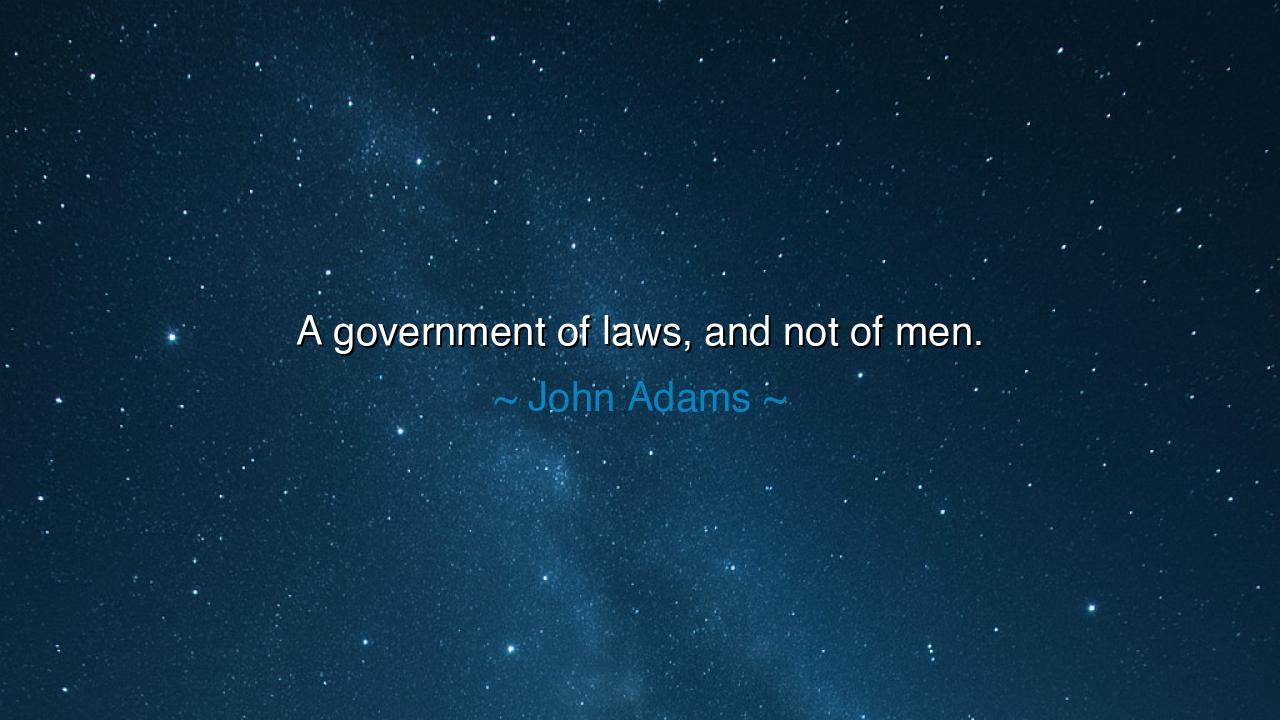
A government of laws, and not of men.






The great patriot and philosopher of liberty, John Adams, once wrote the immortal words: “A government of laws, and not of men.” In this simple yet thunderous declaration lies one of the cornerstones of civilization itself — that justice must rest not upon the whims of rulers, but upon the rule of law, impartial and eternal. Adams, a man of fierce intellect and moral conviction, spoke these words not in peace and comfort, but amid the birth pangs of a new nation — a world struggling to free itself from the tyranny of kings. His cry was not merely for order, but for righteousness — for a society governed by principles, not personalities; by justice, not ambition; by law, not power.
To grasp the meaning of this quote, one must first see the danger Adams sought to prevent. A “government of men” is a realm of arbitrariness, where authority flows from the passions, pride, and corruption of those in power. In such a system, justice bends to favor the mighty, and freedom becomes a privilege granted by the ruler’s mercy. Adams saw in this the root of tyranny — for when law is replaced by will, no man is safe. A “government of laws,” by contrast, binds ruler and subject alike beneath the same standard. It is the great equalizer, the invisible architecture of freedom. Under it, the poorest citizen stands beside the greatest leader as a fellow servant to justice, not a subject to power.
The origin of this phrase comes from Adams’s work in the Massachusetts Constitution of 1780, one of the earliest and most enduring constitutions in the world. In it, he wrote, “to the end it may be a government of laws, and not of men,” establishing a principle that would echo through the American republic and beyond. It was born from centuries of struggle — from the Magna Carta’s defiance of royal will to the Enlightenment’s call for reason over monarchy. Adams, steeped in both classical and Christian thought, believed that human nature, though noble, was flawed, and therefore no individual could be trusted with unchecked power. Laws, he reasoned, must be the chains that restrain ambition, the guardians of liberty against the corruption of men.
History offers a thousand proofs of Adams’s wisdom. Consider the fall of Ancient Rome — once a republic ruled by law, it descended into empire when the authority of the Senate yielded to the will of Caesar. What followed was centuries of autocracy, where law became the tool of emperors and the people became subjects once more. The same pattern appeared in monarchies and dictatorships throughout the ages, where men elevated themselves above law, ruling by decree and destroying the justice they swore to uphold. Against this tide, Adams’s vision stands like a mountain — a reminder that true power is not in domination, but in restraint, not in the ruler’s strength, but in the moral strength of the law itself.
Even in modern times, the lesson endures. Nations rise and fall not by wealth or armies, but by their fidelity to law. Where the rule of law stands firm — where courts are just, contracts sacred, and citizens equal before justice — there, prosperity and freedom blossom. But where the law is twisted to favor the few, or ignored in the name of expedience, decay sets in. The story of Watergate, for instance, is one such modern testament: a powerful president brought to account not by rebellion, but by the rule of law. It proved that in a republic faithful to Adams’s principle, no man, however powerful, stands above justice.
The lesson of this quote is not confined to governments alone. It speaks to the moral order of all human life — that every act of justice begins with submission to principle. The “laws” of which Adams spoke are not only those written in constitutions, but those written in conscience: honesty, fairness, integrity, humility. A society may build courts and legislatures, but if its people live without virtue, its laws will soon become hollow. Thus, the rule of law begins in the hearts of men, and only then extends to the halls of power. When citizens respect truth and honor their obligations, government remains their servant; when they abandon these virtues, the state becomes their master.
And so, my child, remember this sacred teaching: freedom is not sustained by might, but by morality. The strength of a nation lies not in the sword or treasury, but in the justice of its laws and the virtue of its people. Stand always for the rule of law, even when it is inconvenient; question the whims of power, even when they promise comfort. For the moment we exalt men above principles, we return to bondage. But when we live by law — not as chains, but as the embodiment of truth — we safeguard the dignity of all. Let this be the inheritance we pass forward: not a world of rulers and ruled, but a government of laws, under which every soul walks free and unafraid.






AAdministratorAdministrator
Welcome, honored guests. Please leave a comment, we will respond soon